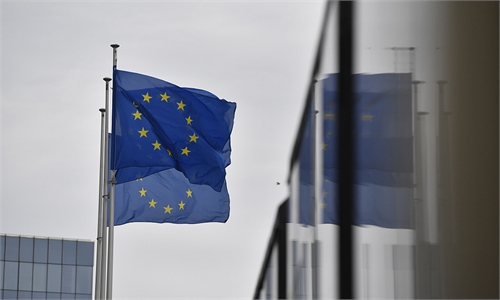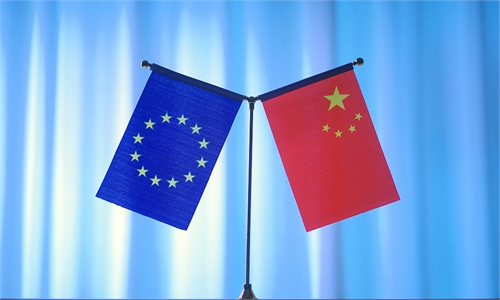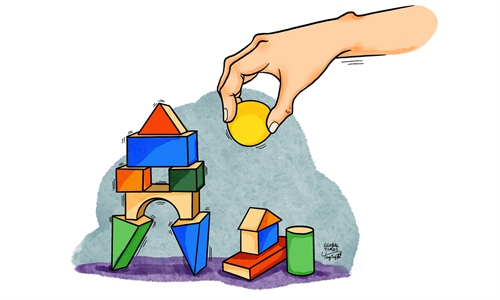EU’s hypocrisy on human rights exposed in COVID-19 vaccine scuffle
Pandemic exposes the real defender of human rights is China: observers
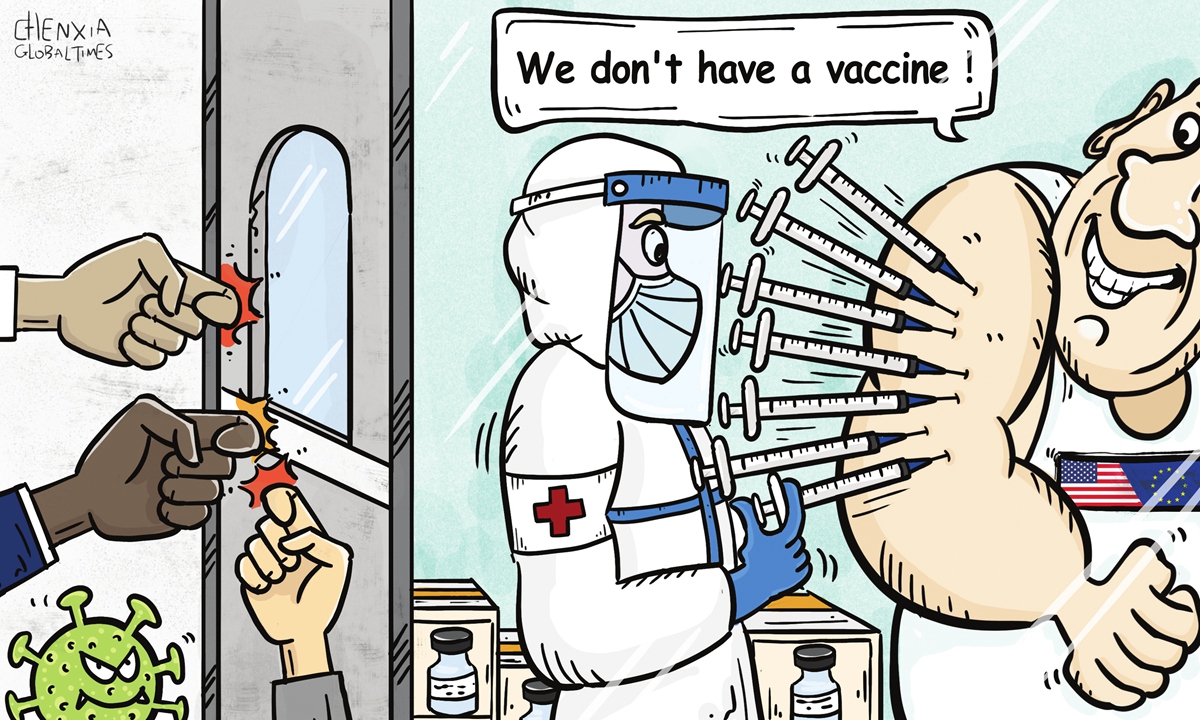
Illustration: Chen Xia/GT
When humanity is still threatened by the pandemic that has already claimed more than 2.74 million lives and when 130 countries are still waiting for vaccines, Western countries have engaged in an "all for itself" vaccine war by slapping on export controls and even intercepting vaccines that pass by their countries, said Chinese observers.
Yet those so-called defenders of human rights wasted no time in echoing the US' formation of a "human rights alliance," and wielded sanctions against China, when the latter is devoted to guaranteeing fair global distribution of vaccines. In terms of self-interest, the fact itself speaks louder than words regarding who is the real defender of human rights and who are merely using it as an excuse to achieve their own political goals.
The European Commission set out a proposal on Wednesday that would give the bloc's governments more powers to block vaccine exports. The proposal is mainly aimed at the UK, who has imported millions of doses from the bloc but hasn't exported any.
The EU, which lags behind the rich countries' club in terms of vaccine inoculation, is under pressure to boost its sluggish vaccination campaign. Such eagerness has propelled the bloc into a months-long scuffle with pharmaceuticals over supply shortages. EU leaders would discuss the export ban regime in talks on Thursday.
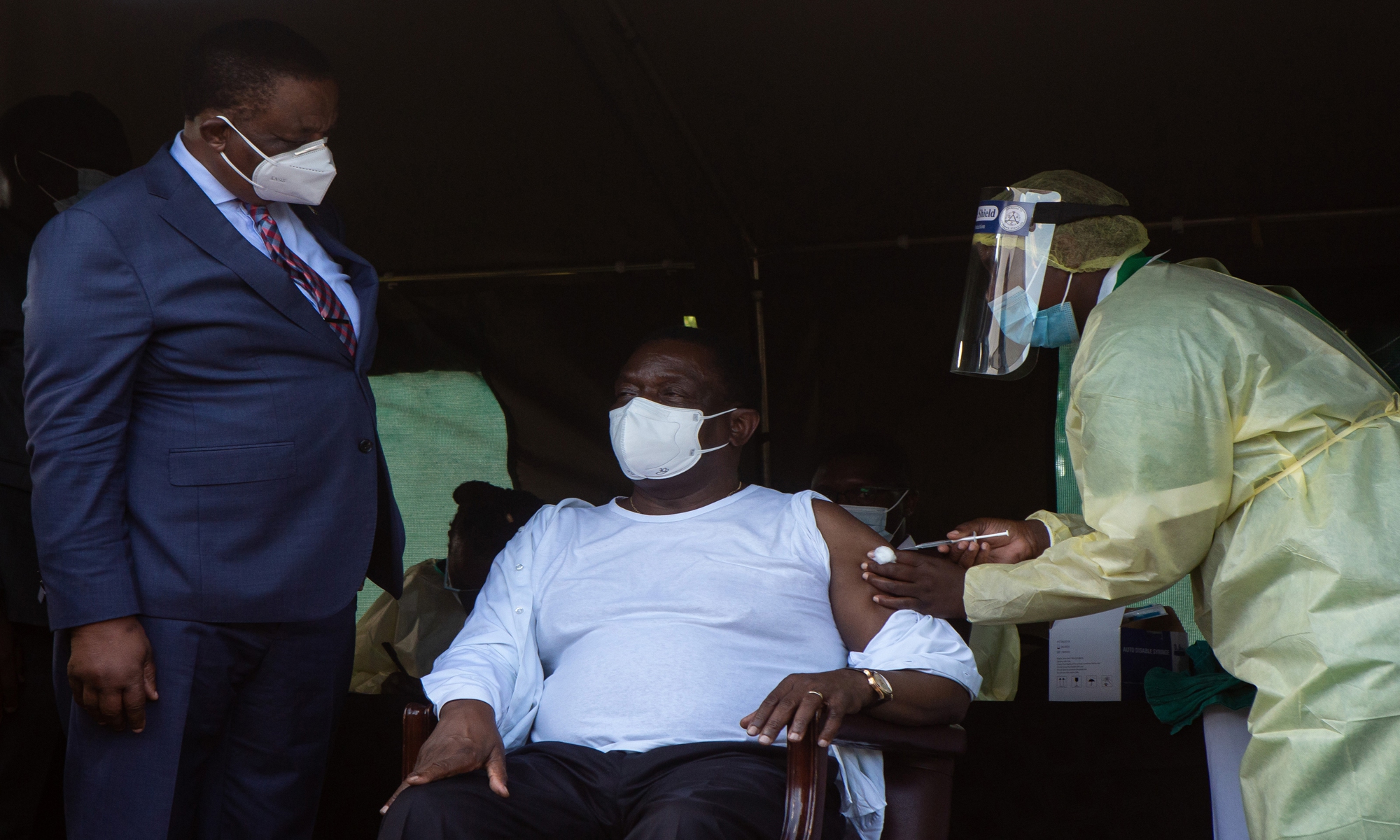
Zimbabwean President Emmerson Mnangagwa receives his first dose of the Sinopharm COVID-19 vaccine on Wednesday in Victoria Falls, Zimbabwe. The country recently received two deliveries of Sinopharm's COVID-19 vaccines donated by China. Zimbabwe is one of a dozen African countries to receive Chinese-made vaccines. Photo: VCG
"Brussels' scrambling for vaccines has exposed their hypocrisy on human rights issues. What they really care about is the lives of Europeans, not the lives of others," Chang Jian, director of Nankai University's Center for the Study of Human Rights in Tianjin, told the Global Times on Thursday.
Chang said the EU's vaccine fight contrasts sharply with its "caring face" on the Xinjiang affairs.
Early this week, the EU imposed sanctions on China over the so-called human rights issues in Northwest China's Xinjiang Uygur Autonomous Region, which were soon hit back at by China's more "fierce and timely" sanctions.
Other Western countries, such as the US, UK and Canada, soon followed suit with the EU.
It took a pandemic to rip off the US-led Western society's "hypocritical coat" in the name of human rights, especially when those Western governments' failed response to the pandemic has claimed the lives of hundreds of thousands in their countries domestically, and their fight for vaccines has taken away chances for other developing countries to inoculate their people, Chang said, noting that pointing fingers at China's human rights issues only exposed the true purpose of those Western countries, which is to "weaponize" human rights to serve their own political aims.
In early March, Italy blocked a shipment of AstraZeneca's coronavirus vaccines destined for Australia after the drug manufacturer failed to meet its EU contract commitments.
Later, AstraZeneca requested permission from the Italian government to export the vaccines but it was rejected by the Italian government with the European Commission supporting its decision. In a move to justify its decision, Italian Foreign Minister Luigi di Maio said that "As long as these [vaccine] delays remain, it is right for the countries of the European Union to block exports to nations that are 'not vulnerable'."
In February, a senior official from the Biden administration, who often criticizes other countries' human rights issues, said that the country won't donate coronavirus vaccines to any impoverished countries because the US purchased doses before most Americans had been vaccinated, the Politico reported.
Some representatives pointed out at the 46th regular session of the UN Human Rights Council on Wednesday that the US, in pursuit of "vaccine nationalism," has hoarded vaccines far in excess of its population during the pandemic, and refused to share them with other countries, including its allies.
"Such a disgraceful human rights record has really disqualified Western countries' from their right to preach to other countries about this subject. Next time they plan to lash out against other countries regarding human rights violations, they should reflect upon themselves first," Chang said.
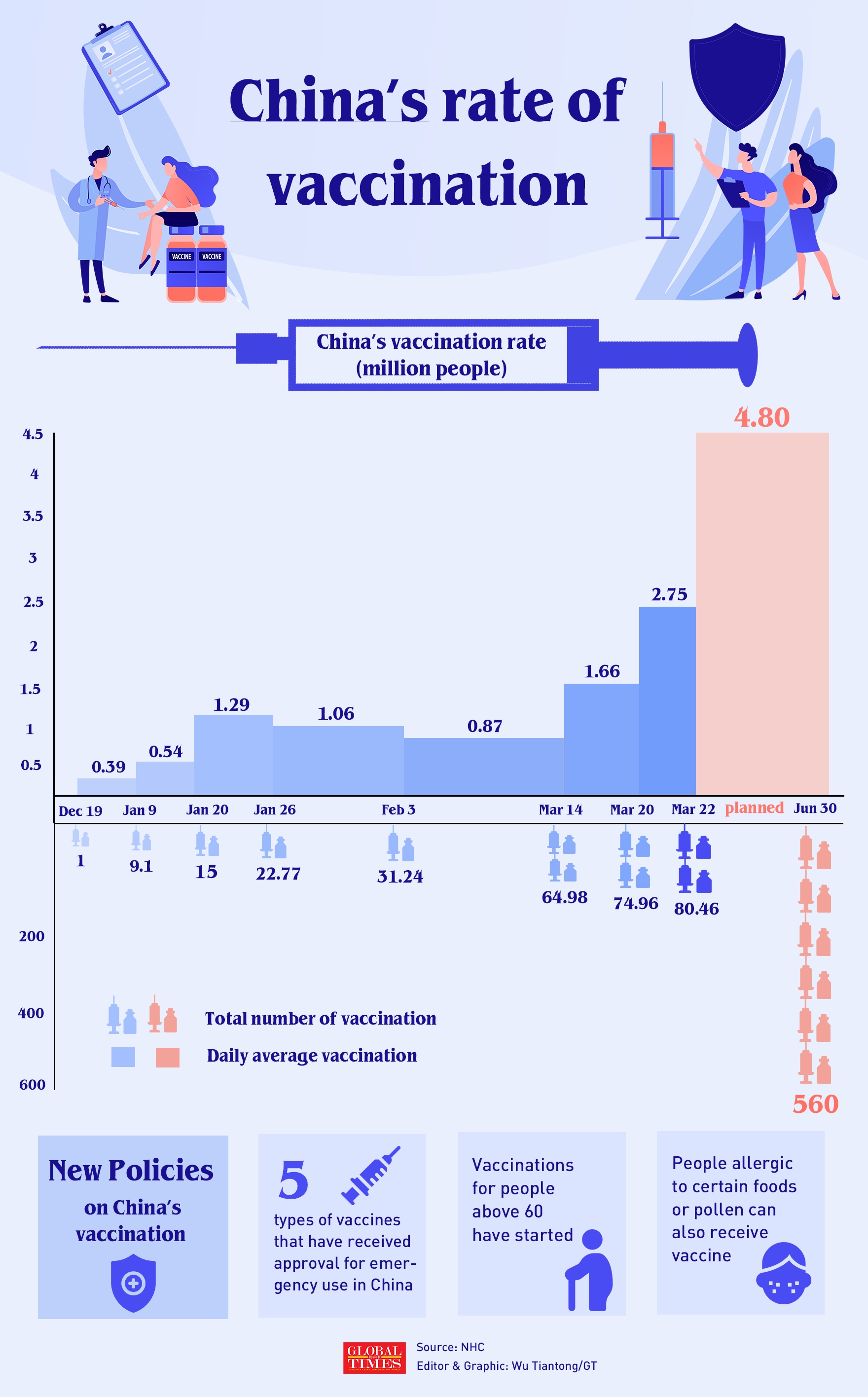
80.46 million people had received COVID-19 vaccination as of Mar 22. After the first vaccine was approved for emergency use in July 2020, China’s vaccination rate has accelerated. Check this graphic for more details: Infographic: Wu Tiantong/GT
Defender of fair distribution
In contrast to the Western world, China stands up as a defender of fair global vaccine distribution. The country is providing and will offer vaccine assistance to 80 countries and three international organizations, China's International Development Cooperation Agency said on March 19.
The pandemic will only go on longer if developing nations fail to get enough vaccines, Chen Xi, an assistant professor of public health at Yale University, told the Global Times on Thursday. "That's why Chinese and Russian vaccines have played a key role in solving this problem."
Even the British Ambassador to China Caroline Wilson once pointed out that China has played an important role in ensuring fair global vaccine distribution, China News Service reported.
China's mass vaccination campaign has entered the fast lane with daily inoculations leaping from 1 million to nearly 3 million within a week.
China is also likely to include foreigners in its vaccination process. Foreigners in Shanghai who meet the requirements will be eligible to take domestically made COVID-19 vaccines, the municipal authorities announced on Tuesday night, making Shanghai the first Chinese city to publicize an inoculation plan for foreigners. Experts also noted that it is possible more cities will follow suit.
A German expat works in a German company in Shanghai, who declined to be named, told the Global Times that his company sent an email urging the employees to take the chance and get vaccinated. "There's no evidence showing that the quality of Chinese vaccines is inferior to European or US vaccines…Thus, I strongly recommend you to accept such a preferential offer."
A total of 150 foreign journalists from 27 countries have voluntarily taken vaccines in China, and they are safe and gratuitous, said Hua Chunying, spokesperson of China's Ministry of Foreign Affairs, in a Wednesday conference. China is doing so for the sake of their health and providing convenience for them in their daily lives in China, she noted.
Many foreign media outlets also casted doubt on China's production capacity, asking whether China can meet the target of mass vaccinations at home while exporting vaccines to other countries and regions.
Minister of Industry and Information Technology Xiao Yaqing emphasized the stable output of China's vaccines on Wednesday. China's current daily output of vaccines has increased from 1.5 million doses on February 1 to the current 5 million doses. It is equivalent to more than 1.8 billion doses a year.
The cumulative supply of domestic vaccines currently exceeds 100 million doses, the minister said.
